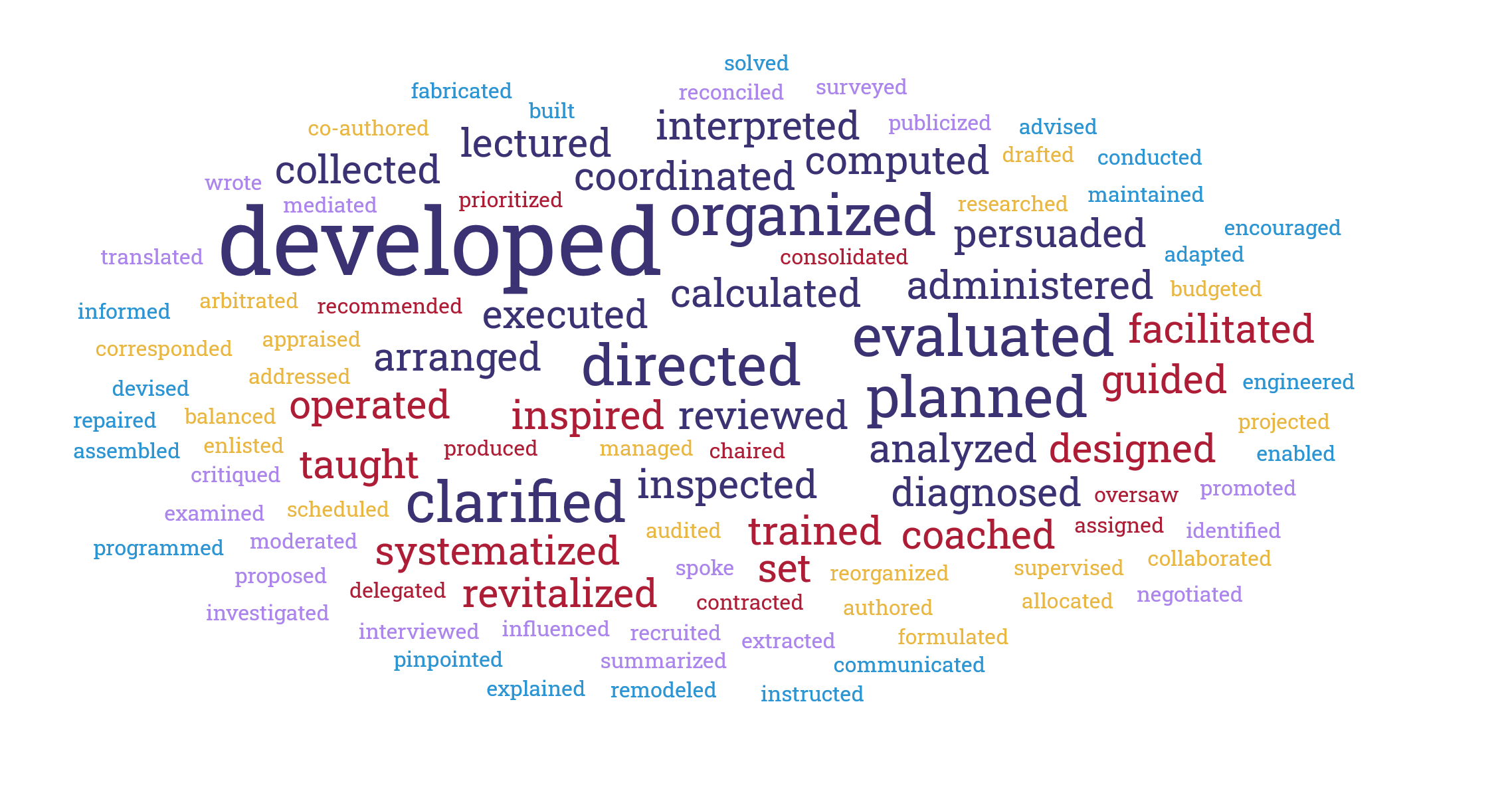In today’s competitive job market, a resume is more than a mere list of experiences and qualifications; it is a personal marketing document that conveys your professional identity. Employers often spend only seconds scanning a resume, making it essential for candidates to present their achievements with clarity, impact, and precision. One of the most effective ways to do this is through the strategic use of action verbs. Action verbs are dynamic words that describe your skills, responsibilities, and accomplishments in a compelling and results-oriented manner. By incorporating them effectively, you can transform a generic resume into a persuasive narrative that captures attention and demonstrates value.
The Importance of Action Verbs in Resumes
Action verbs are the backbone of any impactful resume. They do more than simply describe tasks; they illustrate initiative, leadership, creativity, and measurable outcomes. Unlike passive verbs, which imply routine involvement, action verbs convey agency and energy. For example, instead of writing “Responsible for managing a team,” using “Led a team of 10 employees to exceed quarterly sales targets” immediately conveys leadership, scope, and results.
Using action verbs serves multiple purposes. First, they help you avoid vague and repetitive phrasing. Many resumes fall flat because they rely on weak words like “worked on” or “involved in,” which fail to highlight accomplishments. Second, action verbs make your resume scannable and impactful. Recruiters often skim resumes quickly, and verbs at the beginning of bullet points create instant engagement. Finally, strong verbs can subtly demonstrate your alignment with industry standards and expectations, positioning you as a professional who understands both the role and the results that matter.
To maximize the impact of action verbs, it is important to choose words that match the level of responsibility and achievement in your experiences. For entry-level positions, verbs such as “assisted,” “coordinated,” or “supported” may be appropriate, while mid-level professionals might use “implemented,” “developed,” or “supervised.” Senior-level executives may prefer verbs like “orchestrated,” “transformed,” or “spearheaded,” which communicate strategic vision and organizational influence.
Categories of Action Verbs and Their Application
Action verbs can be grouped into categories based on the type of accomplishment or responsibility they describe. Understanding these categories can help job seekers select the most relevant words for each section of their resume.
Leadership and Management Verbs
Leadership verbs convey the ability to guide, inspire, and achieve results through others. They are especially useful for managers, team leaders, and project coordinators. Examples include:
-
Led
-
Directed
-
Coordinated
-
Supervised
-
Mentored
-
Orchestrated
-
Facilitated
Application Tip: Start bullet points with leadership verbs to highlight your management capabilities. Instead of writing “Responsible for a team of 12,” you could say, “Mentored a team of 12, improving project completion rates by 25%.”
Achievement and Results Verbs
Achievement verbs emphasize measurable results and outcomes. They are ideal for demonstrating tangible contributions that set you apart from other candidates. Examples include:
-
Achieved
-
Exceeded
-
Generated
-
Increased
-
Improved
-
Optimized
-
Delivered
Application Tip: Quantify accomplishments whenever possible. For instance, “Generated a 15% increase in client retention by implementing targeted follow-up strategies” provides a concrete measure of success.
Creative and Problem-Solving Verbs
These verbs showcase your ability to think innovatively, develop solutions, and enhance processes. Examples include:
-
Designed
-
Innovated
-
Developed
-
Conceptualized
-
Streamlined
-
Revitalized
-
Engineered
Application Tip: Use these verbs to highlight your creativity and initiative. For example, “Streamlined reporting procedures, reducing processing time by 30%” demonstrates both innovation and efficiency.
Communication and Collaboration Verbs
Communication verbs emphasize teamwork, interpersonal skills, and the ability to convey ideas effectively. Examples include:
-
Presented
-
Negotiated
-
Advocated
-
Collaborated
-
Advised
-
Promoted
-
Reported
Application Tip: Show how your communication skills led to specific achievements. For instance, “Negotiated contracts with vendors, saving the company $50,000 annually” combines communication with measurable impact.
Practical Tips for Integrating Action Verbs
While action verbs are powerful, their effectiveness depends on proper integration into your resume. Here are some practical strategies to ensure they strengthen your professional narrative:
-
Start Bullet Points with Verbs: Each bullet point should begin with a strong action verb to immediately highlight the skill or accomplishment. For example:
-
Instead of: “Was responsible for managing client accounts”
-
Use: “Managed 20+ client accounts, increasing client satisfaction by 30%”
-
-
Avoid Overused or Generic Verbs: Certain verbs like “helped” or “worked” are too weak to convey significant impact. Replace them with verbs that specify your role and contribution.
-
Tailor Verbs to Job Descriptions: Match action verbs to keywords in the job posting. If a job emphasizes “project management,” use verbs like “coordinated,” “implemented,” or “executed” to demonstrate relevant experience.
-
Combine Verbs with Quantifiable Results: Action verbs are most compelling when paired with numbers, percentages, or tangible outcomes. This gives hiring managers clear evidence of your impact.
-
Maintain Variety and Avoid Repetition: Using a wide range of action verbs prevents your resume from sounding monotonous and showcases the breadth of your skills.
Table of Dynamic Action Verbs
| Category | Sample Verbs |
|---|---|
| Leadership & Management | Led, Directed, Coordinated, Supervised, Mentored, Orchestrated, Facilitated |
| Achievement & Results | Achieved, Exceeded, Generated, Increased, Improved, Optimized, Delivered |
| Creative & Problem-Solving | Designed, Innovated, Developed, Conceptualized, Streamlined, Revitalized, Engineered |
| Communication & Collaboration | Presented, Negotiated, Advocated, Collaborated, Advised, Promoted, Reported |
This table is a practical reference for resume writing. Candidates can select verbs from each category to accurately represent their experience and skillset.
Common Mistakes to Avoid
Even when using action verbs, there are common pitfalls that can undermine their effectiveness:
-
Using Verbs Without Context: Verbs alone do not tell a complete story. Each verb should be followed by a description of what you did and the impact it had.
-
Overloading with Buzzwords: While strong verbs are important, overloading a resume with jargon or overly complex words can seem forced and inauthentic. Balance clarity with dynamism.
-
Neglecting Alignment with Resume Sections: Each section of your resume—work experience, education, or skills—requires different types of verbs. Using a “Leadership” verb for a minor task may appear exaggerated.
-
Ignoring ATS Optimization: Many companies use Applicant Tracking Systems (ATS) that scan resumes for keywords. Incorporate action verbs that align with both human readers and ATS requirements.
Conclusion
Action verbs are indispensable tools for crafting a resume that captures attention, conveys competence, and communicates measurable impact. By carefully selecting verbs that reflect your achievements, responsibilities, and creativity, you can create a compelling narrative that differentiates you from other candidates. Understanding categories such as leadership, achievement, creative problem-solving, and communication allows you to tailor your resume strategically. Combined with quantifiable results and thoughtful sentence structure, action verbs transform a simple resume into a persuasive professional story.
In a job market where first impressions matter and recruiters often spend mere seconds reviewing applications, the words you choose can make all the difference. Start each bullet point with an action verb, provide context, quantify results, and avoid repetition. With these strategies, your resume will not only communicate your experience but also demonstrate the initiative, energy, and results-oriented mindset that employers seek. Ultimately, strong action verbs empower you to present your professional journey in the most convincing and dynamic way possible.

